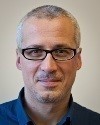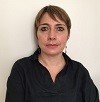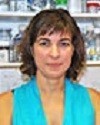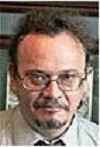About the Editors
Editors-In Chief
Mauro Piacentini, MSc, PhD, University of Rome "Tor Vergata", Italy

Italy, Rome - Dr Piacentini is a Full Professor at University of Rome "Tor Vergata", Rome, Italy. He is also President of the Biotechnology Program at the university, is on the Board of Directors for the European Cell Death Organization and is Basic Research Director at the National Institute for Infectious Diseases in Rome. Since 1993, he has been the Founder and an Editor of the journal Cell Death & Differentiation. He is a journal reviewer for other journals including Brain Research, Cancer Research, Cancer Cell, and Nature. Furthermore, Dr Piacentini has organized several international meetings including the 14th Euroconference on "Apoptosis or Programmed Cell Death". He has co-edited a book entitled "Methods in Enzymology: Programmed Cell Death". His research interest is to understand the molecular mechanisms regulating apoptosis and autophagy under both physiological and pathological conditions. In particular, he is interested in the pathogenesis of Huntington's disease with particular regard to the role of TG2 and mitochondria. He is also studying infectious diseases such as HIV and HCV. With autophagy, he is characterizing the role of Ambra1, a key component of the Beclin1 complex.
KEYWORDS: apoptosis; autophagy; HIV; HCV; Ambra1
ORCID: 0000-0003-2919-1296
Yufang Shi, PhD, Soochow University, Shanghai Institutes for Biological Sciences of Chinese Academy of Sciences, China

China, Shanghai and USA, New Jersey - Yufang Shi is Director and Professor of the Institute of Health Sciences, Shanghai Institutes for Biological Sciences of Chinese Academy of Sciences, Shanghai Jiao Tong University School of Medicine and Soochow University. He also holds a University Professor title at Robert Wood Johnson Medical School, University of Medicine and Dentistry of New Jersey. He received his Ph.D. in Immunology from University of Alberta in 1992. From 1995 to 2001, he was a faculty member at the American Red Cross Laboratory, Holland and George Washington University. His research team studies i) molecular mechanisms of activation-induced cell death in T cell subpopulations; ii) understanding how immunosuppression is mediated in mesenchymal stem cells; iii) tumor stroma and tumor immunology; and iv) psychoneuroimmunology. He is one of the editors of Cell Research and has served on editorial boards of Journal of Immunology, Oncogene, Journal of Biological Chemistry, Cellular and Molecular Immunology, and the American Journal of Translational Research.
KEYWORDS: Apoptosis in lymphocytes; immune regulation; psychoneuroimmunology; bone-lymphocyte connection
ORCID: 0000-0001-8964-319X
Hans-Uwe Simon, MD, PhD, University of Bern, Switzerland

Switzerland, Bern - Simon Hans-Uwe, M.D., Ph.D., is Professor of Pharmacology and since 2000, has been Director of the Department of Pharmacology, University of Bern in Switzerland. After obtaining a doctoral thesis, he specialized in Clinical Immunology, at the University of Jena, Germany. His Postdoc (1990-92) was completed at the Mount Sinai and General Hospitals, University of Toronto, Canada. Professor Hans-Uwe became a Principal Investigator and Deputy Director (1992-2000) at the Swiss Institute of Allergy and Asthma Research, University of Zurich, Davos, Switzerland, with "Habilitation" in Experimental Immunology (1996). He also obtained a Doctoral thesis (Ph.D. 1996-2001) at the Department of Pharmacology, Hebrew University of Jerusalem, Israel. Research interests include: (1) Immunopharmacology; and (2) Role of apoptosis and autophagy in inflammatory diseases and cancer. Among other academic and administrative services, he served as President of the Swiss Society of Pharmacology and Toxicology (SSPT; 2004-2007), President of the Swiss Society of Experimental Pharmacology (SSEP; 2005-2008), President of the European Cell Death Society (ECDO; 2007-2009), and President of the Union of the Swiss Societies for Experimental Biology (USSBE; 2007-2010). He is the Editor-in-Chief of Allergy, the European Journal of Allergy and Clinical Immunology.
KEYWORDS: Immunopharmacology; apoptosis; autophagy; neutrophils extracellular traps; eosinophils
ORCID: 0000-0002-9404-7736
Deputy Editors
Massimiliano Agostini, PhD, University of Rome “Tor Vergata”, Italy
 Italy, Rome - Massimiliano Agostini is Associate Professor in Molecular Biology at the University of Rome “Tor Vergata” (Italy). He obtained his Ph.D from the Department of Clinical and Experimental Medicine, University of Perugia (Italy), working on the pharmacological regulation of the immune response. In 2005, he became a Research Assistant at Section of Pharmacology, University of Perugia (Italy). In 2007-2014, he worked at the MRC Toxicology Unit, Leicester (UK), as Career Development Fellow and then as Senior Investigator. In 2014 worked at TW Mak’s laboratory as visiting scientist, at The Campbell Family Institute for Breast Cancer Research, Toronto (Canada). He is mainly interested in the characterization of transgenic mice with genetic alterations in the p53 family genes and their targets to understand their effect on development and cancer.
Italy, Rome - Massimiliano Agostini is Associate Professor in Molecular Biology at the University of Rome “Tor Vergata” (Italy). He obtained his Ph.D from the Department of Clinical and Experimental Medicine, University of Perugia (Italy), working on the pharmacological regulation of the immune response. In 2005, he became a Research Assistant at Section of Pharmacology, University of Perugia (Italy). In 2007-2014, he worked at the MRC Toxicology Unit, Leicester (UK), as Career Development Fellow and then as Senior Investigator. In 2014 worked at TW Mak’s laboratory as visiting scientist, at The Campbell Family Institute for Breast Cancer Research, Toronto (Canada). He is mainly interested in the characterization of transgenic mice with genetic alterations in the p53 family genes and their targets to understand their effect on development and cancer.
KEYWORDS: p73; neurodevelopment; neurotoxicity; mouse models; cancer
Francesca Bernassola, PhD, University of Rome “Tor Vergata”, Italy
 Rome, Italy – Francesca Bernassola is an Associate Professor in Molecular Biology at the University of Rome “Tor Vergata”, where she earned her PhD in “Biology and physiopathology of epithelial tissues” in 1999. She performed her postdoctoral training at the Memorial Sloan-Kettering Cancer Center (NY, USA), working under the supervision of Dr Pier Paolo Pandolfi on the regulation of the p53 family members by the promyelocytic leukemia protein PML. Her research interests have been centred on the molecular mechanisms regulating p63 and p73 protein stability and biological functions, with major emphasis on their cancer-related activities. More recently, her research activity is focusing on the contribution of the HECT-type E3 ubiquitin ligases to tumorigenesis.
Rome, Italy – Francesca Bernassola is an Associate Professor in Molecular Biology at the University of Rome “Tor Vergata”, where she earned her PhD in “Biology and physiopathology of epithelial tissues” in 1999. She performed her postdoctoral training at the Memorial Sloan-Kettering Cancer Center (NY, USA), working under the supervision of Dr Pier Paolo Pandolfi on the regulation of the p53 family members by the promyelocytic leukemia protein PML. Her research interests have been centred on the molecular mechanisms regulating p63 and p73 protein stability and biological functions, with major emphasis on their cancer-related activities. More recently, her research activity is focusing on the contribution of the HECT-type E3 ubiquitin ligases to tumorigenesis.
KEYWORDS: p63, p73, cell death, ubiquitination
Guido Kroemer, MD, PhD, INSERM, France
 France, Villejuif - Guido Kroemer currently serves as a Research Director at INSERM, in the INSERM Unit 848, located in Villejuif, France. Prior to joining the INSERM (1993), he was Senior Scientist of the European Community at the Spanish National Research Council (CSIC) at the National Center of Molecular Biology (1990-1992) and at the National Center of Biotechnology (1993). He did his postdoctoral training in the Collège de France, Nogent-sur-Marne, France (1988-1989) and at the University of Innsbruck, Austria, after receiving his PhD and MD degrees at the same University in 1985. He also holds a PhD degree in biology (Autonomous University of Madrid, Spain). G. Kroemer is member of EMBO, German Academy of Sciences (Leopoldina), Academia Europaea and European Academy of Sciences and Arts. He received the 2006 Descartes Prize, the highest scientific distinction of the European Union, for his fundamental discoveries in the field of programmed cell death (apoptosis). He also received one of the Grands Prix from the French Academy of Sciences in 2007, as well as the Carus Medal from the German Academy of Sciences. His interests embrace the role of mitochondria in pathological cell death, the contribution of autophagy to disease processes, and the immune response to dying cancer cells.
France, Villejuif - Guido Kroemer currently serves as a Research Director at INSERM, in the INSERM Unit 848, located in Villejuif, France. Prior to joining the INSERM (1993), he was Senior Scientist of the European Community at the Spanish National Research Council (CSIC) at the National Center of Molecular Biology (1990-1992) and at the National Center of Biotechnology (1993). He did his postdoctoral training in the Collège de France, Nogent-sur-Marne, France (1988-1989) and at the University of Innsbruck, Austria, after receiving his PhD and MD degrees at the same University in 1985. He also holds a PhD degree in biology (Autonomous University of Madrid, Spain). G. Kroemer is member of EMBO, German Academy of Sciences (Leopoldina), Academia Europaea and European Academy of Sciences and Arts. He received the 2006 Descartes Prize, the highest scientific distinction of the European Union, for his fundamental discoveries in the field of programmed cell death (apoptosis). He also received one of the Grands Prix from the French Academy of Sciences in 2007, as well as the Carus Medal from the German Academy of Sciences. His interests embrace the role of mitochondria in pathological cell death, the contribution of autophagy to disease processes, and the immune response to dying cancer cells.
KEYWORDS: autophagy; apoptosis; cancer; chemotherapy; tumor immunology
Cristina Muñoz-Pinedo, PhD, Bellvitge Biomedical Research Institute, Spain
 Spain, Barcelona - Cristina Muñoz-Pinedo leads the Cell Death Regulation group at IDIBELL (Bellvitge Biomedical Research Institute) in Barcelona, Spain. She studied Biology in the University of Sevilla, and she started her scientific career in the field of cell death and cancer metabolism under the supervision of Dr Abelardo López-Rivas at the CSIC, in Granada, Spain. After several short stays in international laboratories she received her PhD from the University of Granada in 2001. She then moved to San Diego to work under the supervision of Doug Green at the La Jolla Institute for Allergy and Immunology, where she studied the role of the mitochondria during cell death as an initiator of the apoptotic process and as a "victim" of caspase activation. After a short stay in St. Jude Children's Research Hospital, in 2006 she moved back to Spain to start a lab whose main interest is to understand why and how cells die when deprived of nutrients. Her lab is trying to apply this knowledge to improve treatment of cancer (to kill cancer cells with metabolic inhibitors) and stroke (to prevent ischemic cell death).
Spain, Barcelona - Cristina Muñoz-Pinedo leads the Cell Death Regulation group at IDIBELL (Bellvitge Biomedical Research Institute) in Barcelona, Spain. She studied Biology in the University of Sevilla, and she started her scientific career in the field of cell death and cancer metabolism under the supervision of Dr Abelardo López-Rivas at the CSIC, in Granada, Spain. After several short stays in international laboratories she received her PhD from the University of Granada in 2001. She then moved to San Diego to work under the supervision of Doug Green at the La Jolla Institute for Allergy and Immunology, where she studied the role of the mitochondria during cell death as an initiator of the apoptotic process and as a "victim" of caspase activation. After a short stay in St. Jude Children's Research Hospital, in 2006 she moved back to Spain to start a lab whose main interest is to understand why and how cells die when deprived of nutrients. Her lab is trying to apply this knowledge to improve treatment of cancer (to kill cancer cells with metabolic inhibitors) and stroke (to prevent ischemic cell death).
KEYWORDS: tumor microenvironment, immune system, glucose metabolism inhibition, cell death
Alexej Verkhratsky, PhD, University of Manchester, UK
 UK, Manchester - Alexei Verkhratsky is Professor of Neurophysiology at the University of Manchester, UK. He is also the Section Head of Physiology & Medicine for Academia Europaea, Editor-in-Chief of Cell Calcium and of Membrane Transport & Signalling - Wiley Interdisciplinary Reviews. He graduated from Kiev Medical Institute in 1983, and received his PhD in Physiology from Bogomoletz Institute of Physiology in 1986. Since 1990 Professor Verkhratsky has investigated the physiology and pathophysiology of glia. These studies demonstrated that Ca2+ signaling in glial cells may be regarded as the basis of their excitability. In 2007 Verkhratsky (together with AM Butt) published the first ever Textbook on Glial Neurobiology. In recent years Verkhratsky has studied the pathological potential of astrocytes and microglia in Alzheimer's disease. In particular he discovered the atrophy of astrocytes in the early stages of Alzheimer's disease whereby the diminished astroglial support of neuronal networks may act as a key factor in disruption of synaptic connectivity in neurodegenerative processes. He is also an expert in molecular physiology of calcium signaling in neurons.
UK, Manchester - Alexei Verkhratsky is Professor of Neurophysiology at the University of Manchester, UK. He is also the Section Head of Physiology & Medicine for Academia Europaea, Editor-in-Chief of Cell Calcium and of Membrane Transport & Signalling - Wiley Interdisciplinary Reviews. He graduated from Kiev Medical Institute in 1983, and received his PhD in Physiology from Bogomoletz Institute of Physiology in 1986. Since 1990 Professor Verkhratsky has investigated the physiology and pathophysiology of glia. These studies demonstrated that Ca2+ signaling in glial cells may be regarded as the basis of their excitability. In 2007 Verkhratsky (together with AM Butt) published the first ever Textbook on Glial Neurobiology. In recent years Verkhratsky has studied the pathological potential of astrocytes and microglia in Alzheimer's disease. In particular he discovered the atrophy of astrocytes in the early stages of Alzheimer's disease whereby the diminished astroglial support of neuronal networks may act as a key factor in disruption of synaptic connectivity in neurodegenerative processes. He is also an expert in molecular physiology of calcium signaling in neurons.
KEYWORDS: neurobiology, glia, Alzheimer’s disease, calcium signaling
Boris Zhivotovsky, PhD, DSc, Karolinska Institutet, Sweden
Sweden, Stockholm - Boris Zhivotovsky, PhD, Dr Sci, is Professor of Toxicology at the Institute of Environmental Medicine, Karolinska Institutet (Stockholm, Sweden). He received his PhD in 1975 (in the laboratory of Professor Kaido Hanson) and Dr Sci in Radiobiology and Biochemistry in 1989 in Leningrad (Soviet Union), with both studies investigating molecular mechanisms of radiation-induced death of lymphoid cells. The team was first to describe this phenomenon as an example of programmed cell death. In 1987 he received the USSR State Prize in Science and Technology for development of the theoretical basis of radiation-induced death of lymphoid cells and their use to determine the pathogenesis of radiation sickness. In 1991 he was invited to join Professor Sten Orrenius's group at Karolinska Institutet (Stockholm), where he became a group leader, Associate Professor, Professor, and from 2004 a Head of the Unit of Toxicology. In 2010 he was invited to build a new laboratory investigating apoptosis mechanisms at the Faculty of Basic Medicine, Moscow State University (Russia) and elected as a University Professor. He was first to describe intracellular localization and translocation of caspases, to show that microinjection of cytochrome c can kill cells, to understand that the resistance of small cell lung carcinoma cells and tumors to treatment is partly linked to the absence of expression of caspase-8 and -10, and to present evidence that mitotic catastrophe is not a separate mode of cell death but a process ("prestage") preceding cell death, which can occur through necrosis, apoptosis or autophagy. His recent work is focusing on attempts to increase the sensitivity of lung cancer cells to treatment using regulation of cross-talk between various cell death modalities. He was an organizer of three Nobel Conferences on The Cell Cycle and Cell Death in Disease and several other meetings; received several awards including the Descartes Research Prize (EU Science Award); and was a General Secretary (1999-2007), President-Elect (2007-2010), and President (2010-2012) of the European Cell Death Organization (ECDO). At present he is a member of the Editorial Boards of 8 journals.
KEYWORDS: DNA damage; p53; caspases; ROS; lung cancer

